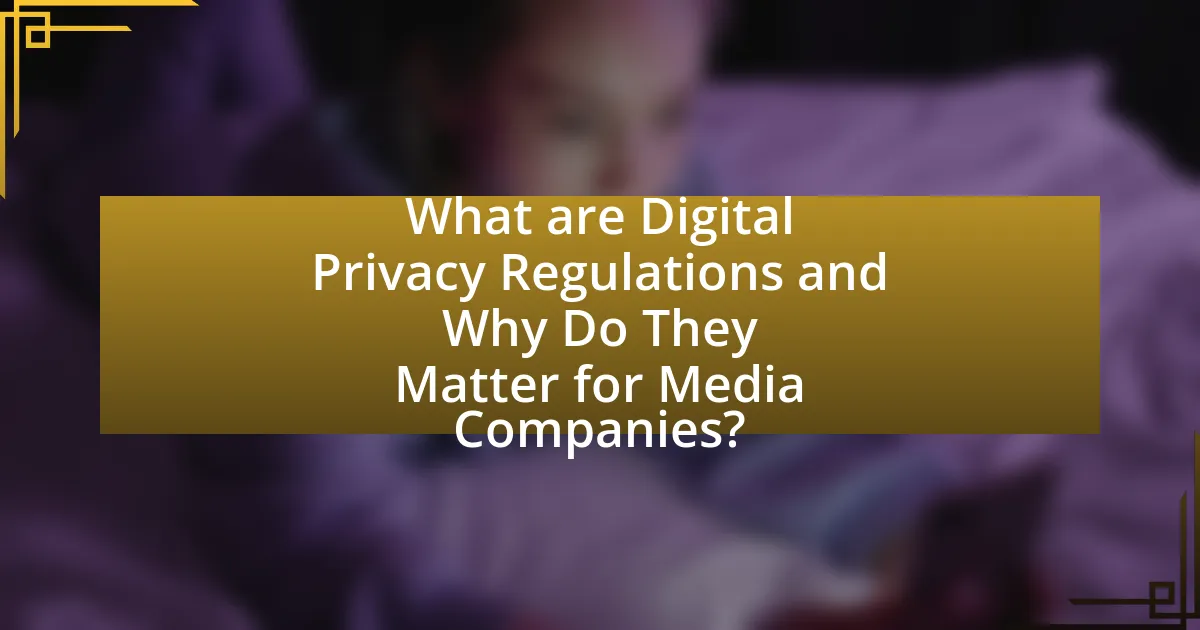Digital privacy regulations are essential laws that protect individuals’ personal information and dictate how organizations, including media companies, manage data. This article examines the implications of these regulations, such as the General Data Protection Regulation (GDPR) and the California Consumer Privacy Act (CCPA), on media operations, highlighting the legal obligations, compliance challenges, and financial risks associated with non-compliance. It also discusses the importance of transparency, employee training, and the role of technology in meeting regulatory requirements, while addressing the evolving landscape of digital privacy laws and their impact on audience trust and content distribution strategies.

What are Digital Privacy Regulations and Why Do They Matter for Media Companies?
Digital privacy regulations are laws and guidelines designed to protect individuals’ personal information and govern how organizations collect, store, and use that data. These regulations matter for media companies because they impose legal obligations that affect data handling practices, influence audience trust, and shape content distribution strategies. For instance, the General Data Protection Regulation (GDPR) in the European Union mandates strict consent requirements for data collection, which can impact how media companies engage with their audiences and monetize content. Compliance with these regulations is essential to avoid significant fines and reputational damage, making them a critical consideration in the operational strategies of media organizations.
How do digital privacy regulations impact media companies’ operations?
Digital privacy regulations significantly impact media companies’ operations by imposing strict guidelines on data collection, usage, and storage. These regulations, such as the General Data Protection Regulation (GDPR) in Europe, require media companies to obtain explicit consent from users before processing their personal data, which can limit their ability to target advertisements effectively. Additionally, non-compliance with these regulations can result in substantial fines; for instance, companies can face penalties of up to 4% of their annual global turnover under GDPR. Consequently, media companies must invest in compliance measures, such as data protection officers and updated privacy policies, which can increase operational costs and complexity.
What specific regulations should media companies be aware of?
Media companies should be aware of regulations such as the General Data Protection Regulation (GDPR), the California Consumer Privacy Act (CCPA), and the Children’s Online Privacy Protection Act (COPPA). GDPR, enacted in 2018, mandates strict data protection and privacy measures for individuals within the European Union, imposing heavy fines for non-compliance. CCPA, effective from January 2020, grants California residents rights regarding their personal data, including the right to know what data is collected and the right to opt-out of its sale. COPPA, established in 1998, requires parental consent for the collection of personal information from children under 13, impacting how media companies target and engage with younger audiences. These regulations collectively shape how media companies handle user data, ensuring compliance to avoid legal repercussions.
How do these regulations vary across different regions?
Digital privacy regulations vary significantly across different regions, reflecting diverse legal frameworks and cultural attitudes toward privacy. For instance, the European Union enforces the General Data Protection Regulation (GDPR), which mandates strict consent requirements and data protection measures, impacting how media companies handle user data. In contrast, the United States adopts a more fragmented approach, with regulations like the California Consumer Privacy Act (CCPA) providing state-specific guidelines but lacking a comprehensive federal standard. Additionally, countries like Brazil have implemented their own regulations, such as the General Data Protection Law (LGPD), which aligns closely with the GDPR but includes unique provisions tailored to Brazilian citizens. These regional differences necessitate that media companies adapt their data practices to comply with local laws, highlighting the complexity of navigating global digital privacy landscapes.
What are the key challenges media companies face in complying with digital privacy regulations?
Media companies face significant challenges in complying with digital privacy regulations, primarily due to the complexity of varying laws across jurisdictions. These regulations, such as the General Data Protection Regulation (GDPR) in Europe and the California Consumer Privacy Act (CCPA) in the United States, impose strict requirements on data collection, consent, and user rights. Compliance necessitates substantial investments in technology and legal expertise to ensure adherence to these diverse standards. Additionally, media companies often struggle with balancing user personalization and targeted advertising against the need for user privacy, which can lead to conflicts in business models. The evolving nature of digital privacy laws further complicates compliance, as companies must continuously adapt to new regulations and interpretations, risking potential fines and reputational damage if they fail to do so.
What are the financial implications of non-compliance?
Non-compliance with digital privacy regulations can lead to significant financial implications for media companies, including hefty fines, legal costs, and loss of revenue. For instance, the General Data Protection Regulation (GDPR) imposes fines of up to 4% of a company’s global annual revenue for violations, which can amount to millions of dollars for large organizations. Additionally, non-compliance can result in costly litigation and settlements, as companies may face lawsuits from consumers or regulatory bodies. Furthermore, the reputational damage from non-compliance can lead to decreased consumer trust and a subsequent decline in sales and advertising revenue, further impacting the financial stability of media companies.
How can media companies manage the complexities of data protection laws?
Media companies can manage the complexities of data protection laws by implementing comprehensive compliance programs that include regular audits, staff training, and legal consultations. These programs should be designed to align with regulations such as the General Data Protection Regulation (GDPR) and the California Consumer Privacy Act (CCPA), which impose strict requirements on data handling and user consent. For instance, GDPR mandates that companies must demonstrate accountability and transparency in their data processing activities, necessitating clear documentation and user rights management. Additionally, ongoing monitoring of regulatory changes and adapting policies accordingly ensures that media companies remain compliant and mitigate risks associated with data breaches and legal penalties.

How Can Media Companies Navigate Digital Privacy Regulations Effectively?
Media companies can navigate digital privacy regulations effectively by implementing comprehensive compliance programs that include regular audits, employee training, and robust data management practices. These programs should align with regulations such as the General Data Protection Regulation (GDPR) and the California Consumer Privacy Act (CCPA), which mandate transparency in data collection and user consent. For instance, a study by the International Association of Privacy Professionals (IAPP) indicates that organizations with established privacy frameworks are 50% more likely to avoid regulatory penalties. By adopting privacy-by-design principles and engaging in proactive communication with users about their data rights, media companies can enhance trust and mitigate legal risks associated with non-compliance.
What strategies can media companies implement to ensure compliance?
Media companies can implement several strategies to ensure compliance with digital privacy regulations, including establishing robust data governance frameworks, conducting regular compliance audits, and providing employee training on privacy policies. A data governance framework helps organizations manage data responsibly, ensuring adherence to regulations such as GDPR and CCPA. Regular compliance audits identify potential gaps in adherence to these regulations, allowing companies to address issues proactively. Additionally, training employees on privacy policies fosters a culture of compliance, reducing the risk of violations. These strategies are essential as non-compliance can lead to significant fines; for instance, GDPR violations can result in penalties up to 4% of a company’s global revenue.
How can technology assist in meeting regulatory requirements?
Technology assists in meeting regulatory requirements by automating compliance processes and enhancing data management. For instance, software solutions can track and document data handling practices, ensuring adherence to regulations such as GDPR and CCPA. These tools often include features like real-time monitoring, audit trails, and reporting capabilities, which facilitate transparency and accountability. According to a report by the International Association of Privacy Professionals, organizations that implement compliance technology can reduce the risk of non-compliance by up to 50%, demonstrating the effectiveness of technology in regulatory adherence.
What role does employee training play in compliance efforts?
Employee training is crucial in compliance efforts as it equips staff with the knowledge and skills necessary to adhere to regulations. Effective training programs ensure that employees understand digital privacy laws, such as the General Data Protection Regulation (GDPR) and the California Consumer Privacy Act (CCPA), which are essential for media companies to avoid legal penalties. Research indicates that organizations with comprehensive compliance training experience a 50% reduction in compliance violations, highlighting the direct impact of training on adherence to regulations.
What best practices should media companies adopt for data privacy?
Media companies should adopt best practices such as implementing robust data encryption, conducting regular privacy audits, and ensuring transparent data collection policies. Data encryption protects sensitive information from unauthorized access, while privacy audits help identify vulnerabilities and ensure compliance with regulations like GDPR and CCPA. Transparent data collection policies build trust with users by clearly informing them about what data is collected and how it is used, which is essential for maintaining user confidence and adhering to legal requirements.
How can media companies build trust with their audience regarding data usage?
Media companies can build trust with their audience regarding data usage by implementing transparent data practices and actively communicating their data policies. Transparency involves clearly outlining what data is collected, how it is used, and who it is shared with, which can be supported by privacy policies that are easily accessible and written in plain language. According to a 2021 survey by the Pew Research Center, 79% of Americans expressed concern about how their data is being used by companies, highlighting the importance of clear communication. Additionally, media companies can enhance trust by allowing users to control their data preferences, such as opting in or out of data collection, which fosters a sense of agency and security among users.
What are the benefits of transparency in data handling?
Transparency in data handling enhances trust between organizations and their stakeholders. When companies openly communicate their data practices, they foster a sense of accountability and reliability, which can lead to increased customer loyalty and engagement. According to a 2020 survey by the International Association of Privacy Professionals, 70% of consumers are more likely to engage with companies that demonstrate transparency in their data usage. Furthermore, transparency helps organizations comply with regulations such as the General Data Protection Regulation (GDPR), reducing the risk of legal penalties and enhancing their reputation in the market.

What are the Future Trends in Digital Privacy Regulations Affecting Media Companies?
Future trends in digital privacy regulations affecting media companies include increased enforcement of data protection laws, a shift towards user consent models, and the emergence of global regulatory frameworks. Regulatory bodies are intensifying scrutiny on how media companies collect, store, and utilize personal data, as seen with the implementation of the General Data Protection Regulation (GDPR) in Europe, which has set a precedent for similar laws worldwide. Additionally, there is a growing emphasis on transparency and accountability, compelling media companies to adopt clearer privacy policies and practices. As consumers become more aware of their privacy rights, media companies will likely need to prioritize user consent mechanisms, ensuring that individuals have control over their data. This trend is further supported by the increasing number of privacy-related lawsuits and fines, which highlight the financial risks of non-compliance.
How are emerging technologies influencing digital privacy regulations?
Emerging technologies are significantly influencing digital privacy regulations by necessitating more robust frameworks to protect user data. The rise of artificial intelligence, big data analytics, and the Internet of Things has led to increased data collection and processing capabilities, prompting regulators to address potential privacy risks. For instance, the General Data Protection Regulation (GDPR) in Europe was enacted in response to the growing concerns over data privacy in the digital age, establishing strict guidelines for data handling and user consent. Additionally, the California Consumer Privacy Act (CCPA) reflects similar trends in the U.S., emphasizing transparency and user rights in data management. These regulations are evolving to keep pace with technological advancements, ensuring that privacy protections are adequate in an increasingly data-driven environment.
What potential changes in legislation should media companies anticipate?
Media companies should anticipate changes in legislation focused on digital privacy regulations, particularly in areas such as data protection, consent requirements, and transparency obligations. For instance, the implementation of the General Data Protection Regulation (GDPR) in the European Union has set a precedent for stricter data handling practices, which may influence similar regulations in other jurisdictions. Additionally, the California Consumer Privacy Act (CCPA) has introduced new consumer rights regarding personal data, prompting discussions about similar laws at the federal level in the United States. These legislative trends indicate a growing emphasis on user privacy and data security, compelling media companies to adapt their practices to comply with evolving legal standards.
How can media companies prepare for evolving privacy expectations from consumers?
Media companies can prepare for evolving privacy expectations from consumers by implementing robust data protection policies and enhancing transparency in data usage. Establishing clear privacy policies that comply with regulations such as the General Data Protection Regulation (GDPR) and the California Consumer Privacy Act (CCPA) is essential, as these laws set standards for consumer data rights and privacy. Additionally, conducting regular audits of data practices and investing in privacy-focused technologies can help companies stay ahead of consumer expectations. Research indicates that 79% of consumers are concerned about how their data is used, highlighting the importance of proactive measures in building trust and maintaining customer loyalty.
What practical steps can media companies take to stay ahead of digital privacy regulations?
Media companies can stay ahead of digital privacy regulations by implementing robust data governance frameworks. These frameworks should include regular audits of data collection practices, ensuring compliance with existing regulations such as GDPR and CCPA, and adopting privacy-by-design principles in product development. For instance, a study by the International Association of Privacy Professionals indicates that organizations with strong data governance are 50% more likely to avoid regulatory fines. Additionally, investing in employee training on data privacy and establishing clear privacy policies can further enhance compliance and build consumer trust.
How can ongoing monitoring of regulations benefit media companies?
Ongoing monitoring of regulations benefits media companies by ensuring compliance and minimizing legal risks. By staying updated on changes in digital privacy laws, such as the General Data Protection Regulation (GDPR) and the California Consumer Privacy Act (CCPA), media companies can adapt their practices to avoid costly fines and reputational damage. For instance, companies that proactively adjust their data handling processes in response to regulatory updates can maintain consumer trust and enhance their competitive advantage in a rapidly evolving digital landscape.
What resources are available for media companies to enhance their compliance efforts?
Media companies can enhance their compliance efforts through various resources, including legal consulting services, compliance software, and industry-specific training programs. Legal consulting services provide expert guidance on navigating complex regulations such as GDPR and CCPA, ensuring that companies understand their obligations. Compliance software automates processes related to data management and reporting, helping organizations maintain adherence to legal standards efficiently. Additionally, industry-specific training programs educate employees on compliance best practices and the importance of data privacy, fostering a culture of compliance within the organization. These resources collectively support media companies in effectively managing their compliance responsibilities.

Leave a Reply